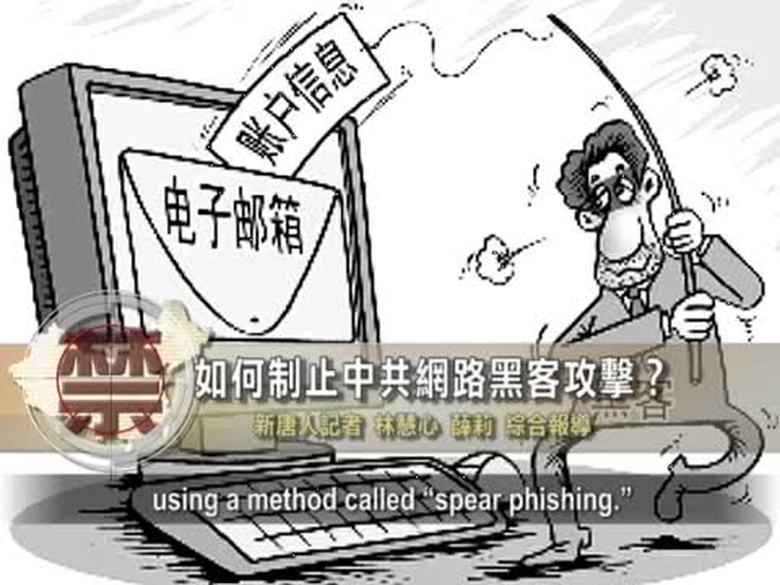【新唐人2011年6月4日訊】谷歌聲明Gmail電子郵件服務的一些賬戶,受到來自中國濟南地區的黑客攻擊後。這一消息迅速得到世界各地媒體的廣泛報導。中共外交部反駁谷歌有關黑客竊密指控。對此,美國聯邦政府就谷歌提出的指控展開調查。那麼,到底誰是黑客幕後的操縱者呢?請看報導。
谷歌宣佈美國官員的Gmail郵箱,遭中國黑客嚴重襲擊,驚動了白宮和美國國土安全部。美國匆忙評估事件是否造成國家安全受損問題。白宮聲稱針對黑客攻擊,目前已經採取行動。
美國國務卿希拉里.克林頓週四(6月2日)表示,美國政府非常嚴肅的看待谷歌提出的指控,認為中國黑客入侵事件“非常嚴重”,美國將嚴肅對待。美聯邦調查局正與谷歌一起,調查有關的黑客行為。
《美國之音》報導,對於美國來說,「網絡安全」目前已經被提到了「外交事務」的首要日程上來。美國國務院最近專門任命了一位網絡安全協調人,集中研究信息如何被盜、以及如何降低衝突的危險。
儘管,白宮方面表示,目前沒有理由認為政府部門的電子郵件遭到侵襲。谷歌也沒有具體說明到底都有哪些美國政府官員的電子郵件受到攻擊、以及他們的電子郵件信箱被暴露有多長時間。不過,克林頓國務卿表示,美國認為,網絡安全將是一個持久的問題,對此十分重視。
谷歌發言人傑伊.南卡洛(Jay Nancarrow)書面回答《美國之音》,他說:“我們相信這次盜竊用戶密碼的活動,是來自中國濟南。我們無法確切說明誰是操縱者?”
6月2號,中國(共)反駁了谷歌的指控。中國外交部發言人洪磊表示,對於谷歌公司的指控無法接受。
谷歌公司在聲明中表示,他追蹤到這些黑客是來自中國的山東省會濟南。在濟南,中國(共)解放軍設有技術偵察局和一所技術學院。
《美國之音》也證實,去年,美國調查人員在調查對谷歌用戶一起類似的黑客攻擊時,也追索到同一地點。
《美國之音》還報導,自從谷歌公司因為網路新聞檢查和黑客攻擊事件,而於2010年上半年部分退出中國市場後,谷歌公司和北京的關係一直緊張。去年,《紐約時報》指認,濟南的「藍翔技術學校」,是對谷歌發動所謂的「極光行動」攻擊的兩個教育機構之一。
英國記者麥特.沃爾曼在《電訊報》中指出,北京強烈譴責谷歌所說的:中國(共)處心積慮,試圖打入美國政府高官和中國活動人士電子郵件帳戶的說法,是'不可接受的',中國(共)不姑息寬恕黑客行為。但黑客行為在中國,有許多網站提供價格低廉的教程,讓人可以學到黑客基本功。
上個月,人權網站change.org表示,這個網站自從發起網上運動,要求釋放藝術家艾未未以來,網站反覆遭受來自中國的攻擊。現在不清楚攻擊者的身份以及他們的動機,但谷歌指認濟南是網絡攻擊的發源地,這跟先前網絡安全專家進行的調查思路是一致的。
日本6月2號的《每日新聞》則報導說,現在還不清楚受害者當中,是否包含日本政府官員。
新唐人記者唐睿、孫寧綜合報導。
Who』s Hackers』 Manipulator?
The news of some Google Gmail accounts having
been attacked by hackers from Jinan, China
has quickly gained worldwide media coverage.
Chinese Department of State refuted allegations
of Chinese hacking Gmail to steal information.
U.S. has started investigation on Google's allegations.
Who is the behind-the-scenes manipulator?
As per Google, some U.S. officials』 Gmail accounts
were under serious attacks by Chinese hackers.
The U.S. Department of Homeland Security is
assessing the potential damages to national security.
The White House said it had already taken actions.
U.S. Secretary of State Hillary Clinton said on June 2,
the U.S. government considers the hacking incident
to be "very serious”, and it will be treated seriously.
FBI is working with Google to investigate.
Voice of America (VOA) reported, "network security"
was already included on U.S. foreign affairs agenda.
U.S. State Department has recently appointed a
network security coordinator, who focuses on
how info is stolen and how to reduce the risk.
The White House said there is no reason to believe
government department email accounts were attacked.
Google didn』t disclose details on the U.S. officials,
whose e-mail accounts were attacked. As per Clinton,
U.S. believes network security is a persistent issue
and attaches great importance to it.
In Google spokesman Jay Nancarrow』s written reply
to VOA, he said the campaign of stealing passwords
is believed to originate from Jinan, China.
They cannot specify who the manipulator is.
Chinese authorities refuted Google』s allegations.
On June 2, China Department of State spokesman
Hong Lei said Google's charges were unacceptable.
Google said in a statement, the hackers were traced
to Shandong Province』s capital Jinan. In Jinan,
there is a military technological investigative bureau.
VOA confirmed that in 2010, one U.S. investigation
of hacker attacks on Google account users
traced back to the same location.
As per VOA, after Google withdrew from China
due to news censorship and hacker attacks in 2010,
its relationship with Beijing has been tense.
In 2010, New York Times identified Jinan』s
Lan Xiang Technical School to be one of the
two educational institutions that attacked Google.
British journalist Matt Warman wrote on Telegraph:
Beijing strongly condemned Google』s allegations of
the regime trying to break into U.S. officials and
Chinese activists』 mail accounts to be “unacceptable”.
However, in China, many websites provide
cheap tutorials on basic hacking skills.
In May, Human Rights website change.org said that
since it launched an online campaign to rescue
Chinese dissident artist Ai Weiwei, it has been
subject to cyber attacks from China.
The attackers』 identity and their motive are unclear.
Google』s identification of Jinan as hackers』 location
is in line with the findings of previous investigations.
On June 2, Japanese paper Mainichi reported, it is
unclear if any Japanese officials are victims.
NTD reporters Tang Rui and Sun Ning
























